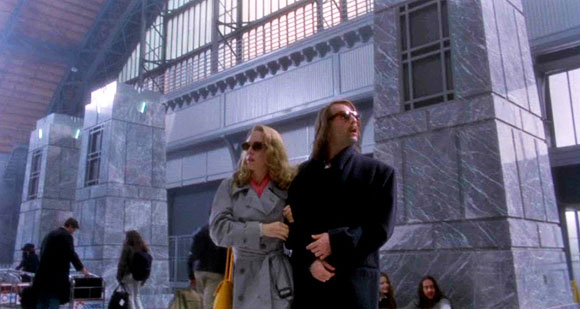|
"I don't get it. Who was that little boy and what did he have to do with Bruce Willis?" --woman who was obviously unclear on the concept of 'time travel story' in a theater restroom after having seen the film 12 Monkeys This morning, I read an article about how the (male) producer of the movie Annihilation is at odds with its (male) director. This, because "After the screening, Ellison (the producer) became concerned that the movie was “too intellectual” and “too complicated” and wanted changes made to make it appeal to a wider audience." Okay. A couple of things here. First? Because one of the changes he wanted to make involved making Natalie Portman's character, the biologist, more 'sympathetic' I can't help feeling a lot of the issues involve men and misogyny. I read the novel. The biologist is a complex, even difficult character. She's not a happy person. Women are simply not allowed to be difficult on screen in mainstream America unless they're being categorized and dismissed. (see The Iron Lady[1]) Secondly, SFF has never actually been a mainstream thing. It's niche. Most people who watch super hero films don't read comics, and most consumers of SFF media don't read. You can see this at ComicCons everywhere. The entire focus is on TV or film stars and buying media-related...stuff. The literary arm of the convention--even comic book art--is an afterthought. Better yet, compare the attendance numbers between SFF literary conventions (100-800 people) and ComicCons. I'll say it again. SFF is not actually a mainstream thing. TV and film are. I'm not saying that mainstream audiences aren't welcome. Sure they are. Anyone is welcome to be a fan and should be able to be a fan in any way they choose to be. This is not a "there is only one way to be a SFF fan" kind of post. It is, however, a post about who decides what SFF is, however, and that's an important distinction. When it comes to storytelling SFF has always been a broad category. It spans lowbrow and highbrow. It runs across all sorts of preferences and themes. It's meant to because the sign of a healthy, creative genre is variety. In this way, action driven properties like The Fifth Element or Star Wars exist in the same SFF bucket as The Handmaid's Tale and Fahrenheit 451. SFF is intended to appeal to both the visceral and the intellect. Both aspects of storytelling are important to the genre. And that's why it's vital that SFF TV and film are permitted the same range of existence. Dumbing down SFF for mainstream audiences doesn't just ruin SFF's spirit, it also does a disservice to SFF audiences. I know I hate it when a movie talks down to me. Frankly, Annihilation wasn't ever going to be Star Wars, and I don't understand why the producer doesn't see that. Arrival was complicated and beautiful and brilliant--and so was the story upon which it was based. (see Story of Your Life by Ted Chiang) And yet, it did just fine. For that reason, I'm glad the director was able to stand up for the film. I've a feeling SFF fans will be glad he did. ---------------------------------------------------------
[1] I'll be the first to admit that I'm not a fan of Margaret Thatcher. Seriously. But watching her totter around like an old bag lady for two hours was a bit much. The whole film focused on that one aspect of her life. Sure, it portrayed her improbable rise to power, but it undercut this with scenes of her dementia. The film utterly lacked a demonstration of the power she wielded as Prime Minister as well as the vast damage she did. Ultimately, it failed to see her as a complete person.
0 Comments
Your comment will be posted after it is approved.
Leave a Reply. |
Archives
March 2023
|

 RSS Feed
RSS Feed